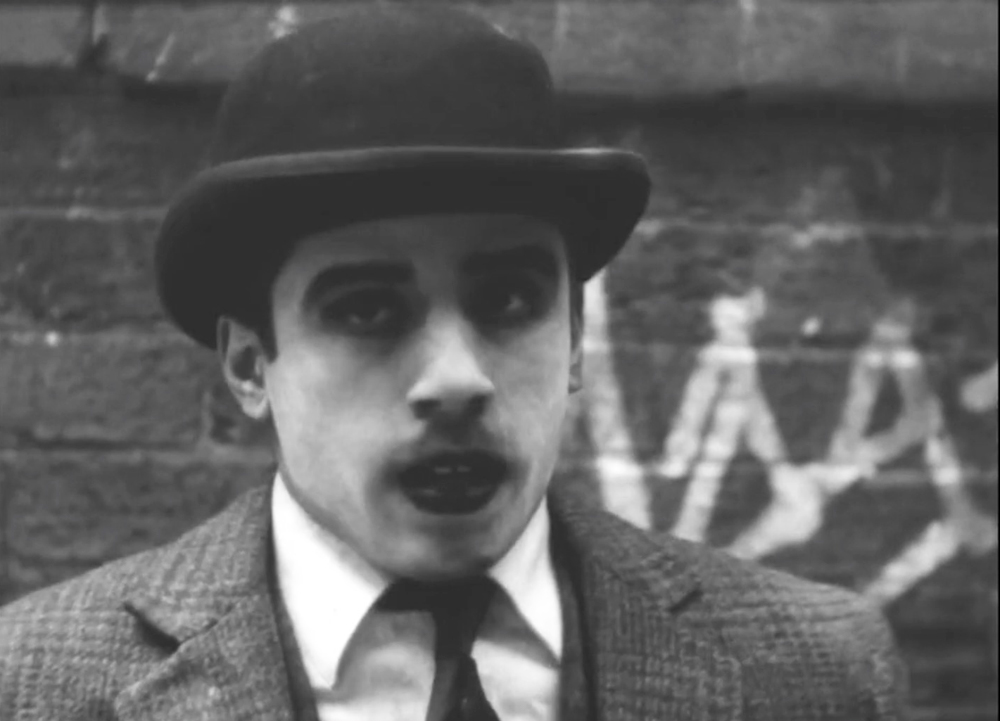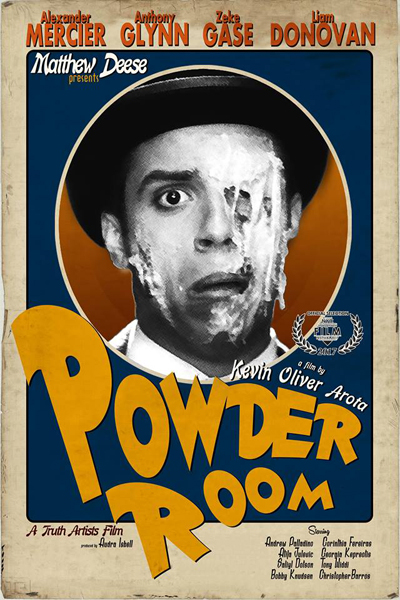
Alex Mercier starring in Director Kevin Arota’s sublime black and white silent movie that is both surreal and transcendent.
All Pictures Either from POWDER ROOM or the Facebook Page of Truth Artists Production
Runner-up, Fiction, 2017 CUNY Asian American Film Festival
Selected for the New York City Independent Film Festival
14 Minutes
A few minutes into Director Kevin Arota’s superb rendering of a black and white silent film, circa 1930s or thereabouts, with a piano film score as authentically sounding as one may image from that silent film era of long ago, it becomes clear that much more is in store for an audience than what was intimated in the press information: A short silent film about an outsider, Al, breaking into a back alley speakeasy of which he’ll later find out to be a place of evil.
Here’s my cue: Al flounders on the edge of the abyss trying to be something that he isn’t in an isle that doesn’t want people like him. Another cue: Ralph Waldo Emerson, at the beginning of the film: “To be yourself in a world that is constantly trying to make you something else is the greatest accomplishment.”
There is so much more in POWDER ROOM than 14 minutes of vintage slapstick smartly resurrected in this film. Al, smartly played by actor Alexander Mercier, painfully learns at the entrance to the speakeasy, after bouncing off a hostile bouncer in quintessential slapstick style, that the animus of the security guard is inflamed by Al’s dark complexion.
Al, however, eventually does get in, not by persistence but by serendipitously stumbling upon a solution just around a corner from the speakeasy. After smearing himself with white face, he is ushered ceremoniously inside the club by the very bouncer who earlier treated him with savage, abject contempt. But once in, Al treks for hours through doors and hallways trying to find his way to his anticipated speakeasy pleasures. The audience, by know, should know that a monster of a nightmarish reality is in play.
POWDER ROOM is transcendent in the absurdist fashion of, but not limited to, Beñuel. Its grisly elements can also make one recall episodes of Rod Serling’s Twilight Zone, the pioneer for stories suffused in metaphysical, paranormal and mystical plots addressing the human condition.
Beñuel, of course never incorporated anything remotely from that period of silent films and slapstick comedy but he would appreciate the savage absurdism of POWDER ROOM Director Kevin Arota has. Via the vehicle of a film genre that’s been dead for years but absolutely not dead, in fact masterfully resurrected, POWDER ROOM will gnaw at one’s subconscious. The pungent, slapstick comedic scenes throughout the movie are laced with a powerful undertone of menace, threats of mayhem, and, nearing the denouement, grotesque debauchery and degeneracy of a demonic speakeasy.
One of the marvels of POWDER ROOM is the way that the moral depravity comes wrapped stylishly, from nuanced movements by actors and actresses to their bold strokes, in a slap stick film genre that made stars long ago of comedians like Harold Lloyd, Charlie Chapman and Buster Keaton even though the comedic in this film can be savagely horrific. The entire cast for this film deserves several curtain calls.
Please Note: All Pictures Used in This Review Are from POWDER ROOM or the Facebook Page of Truth Artists Production.
Director Kevin Arota, who graduated this past semester from Brooklyn College, is an avowed aficionado of classic films featuring Harold Lloyd, Buster Keaton, Charlie Chapman and the like. And that reality provides insight into the impressive craftsmanship of POWDER ROOM, which has been also selected for the 40th Asian American International Film Festival, July 21 to July 30, New York City. So, what’s next on his agenda.

For the short term, he said, “My short term, right now, actually I’m producing another pilot episode for Truth Artists Film, for a pilot episode that we can shop around. That’s sort of the short term. That’s going to happen within the year. Long term, I’m currently developing a manuscript for more feature lengths.”
Asked for more detail about long-term projects, he said, “Okay, (one) theme is about, well, it’s a story about my mother. It’s about her journey from a small town, poor country, from the Philippines, to this country.” It deals with the challenges his mom, a lesbian, faced in the 80s.
Arota decided in his senior year in high school that he wanted to make films.” I first had my first try in film making back in senior high school, which was very unexpected. I’m not really the academic type, I didn’t really pay much attention to school. I was into the arts. I liked drawing … and backed into filming and then I had this thing, the projects that came in high school. So like a year after senior high school, that’s when I decided okay, this is something I want do for a living or something I want to do as a career.
Why did he choose Brooklyn College?
“First I went to BMCC (Borough of Manhattan Community College). I went to Brooklyn. It was either that or City College,: and Brooklyn college was closer to where he lived. “And then I was researching the faculty, they’re more narrative oriented as opposed to City College or Hunter.”
Since 2004, the CUNY Asian American Film Festival (AAFF) has recognized and awarded over $10,900 in cash prizes to student filmmakers enrolled at the City University of New York, including City College, Brooklyn College, Hunter College, Lehman College, College of Staten Island, and Queens College. The CUNY AAFF helps to promote the artistic visual talents and stimulate communication among CUNY students who are separated by the different campuses, and serve as a central location to display their creative works
Gregg Morris can be reached at gmorris@hunter.cuny.edu
